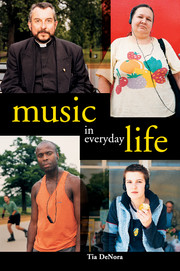Preface and acknowledgements
Published online by Cambridge University Press: 22 September 2009
Summary
On a drizzly Saturday morning in July 1998, I was sheltering under a tree in a North London market, conducting a series of impromptu interviews with women on the topic of ‘music in their lives’. A contact had agreed to let me attach myself to her record stall and to vouch for me if questions arose. During a lull, the market manager wandered over to ask what I was doing. He told me he was originally from Nigeria, where, he said with emphasis, they ‘really knew’ how to use music. The situation was different in the United Kingdom, he said, where people did not seem to be aware of music's powers, and did not respect its social and physiological force. As he saw it, Europeans merely listened to music, whereas in Africa people made music as an integral element of social life. His mother, for example, sang certain songs as a regular part of her tasks and chores, even culinary operations, and she made use of different rhythms for different things. In Nigeria, he concluded, people had a richer and more overt understanding of music's powers, and a knowledge of how to harness those powers was considered to be an important part of common sense. By contrast, in the cold and over-cognitive climate of pre-millennium Britain, people were considerably less reflexive about music as a ‘force’ in social life.
For me, this encounter was deeply significant.
- Type
- Chapter
- Information
- Music in Everyday Life , pp. ix - xivPublisher: Cambridge University PressPrint publication year: 2000



